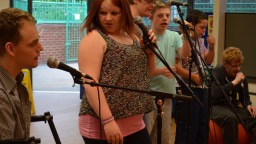Musical inclusion

In this section
What is musically inclusive practice?
About the Musical Inclusion programme
Musical inclusion resources
Musical inclusion case studies and reports

What is musically inclusive practice?
Musically inclusive practice ensures that all children and young people who want to can make music. True inclusivity can only happen in music education if there are opportunities for all children and young people to be supported as musicians across all genres and styles, by practitioners who understand their needs and worldviews and who are equipped to help them on their individual learning journeys.
A musically inclusive project, hub or school therefore:
- identifies and works to break down any barriers to music-making that young people face
- puts the voices of children and young people at the heart of work which is relevant to their needs and interests
- places emphasis on young people’s self-expression and musical creativity
- supports a diversity of high-quality music-making across a wide range of genres and musical activities
- actively works to create understanding among all those involved in music education of the different approaches to teaching and learning
- does all this through all areas of its work: making inclusion a central factor in funding and resource allocation; strategy and planning; programming/curriculum; staffing and professional development.
About the Musical Inclusion programme
Musical Inclusion was a programme funded by Youth Music, running from April 2012 to March 2015. This page contains archived documents from that programme of work.
Youth Music invested in 26 Musical Inclusion projects, tasked with ensuring that all children and young people in their local areas were able to access music-making opportunities, by working in and through the (new at that point) Music Education Hubs.
Sound Sense led the Musical Inclusion Evaluation and Networking team. Read their report on the project, The Power of Equality 2: Final evaluation of Youth Music's Musical Inclusion programme 2012-2015, published in November 2015.
(The team also published an interim report, The Power of Equality, in June 2014.)
Projects carried out music education work with children in challenging circumstances; workforce development to ensure the quality of the provision; and strategic working to ensure integration of musically inclusive practice in hubs across England.
Musical inclusion resources
- For a clear introduction to musical inclusion:
Download Creating a musically inclusive England: a call to action for all music educators
- Youth Music's publication Do, Review, Improve: A quality framework for music education is a practical self-assessment tool for improving the quality of your music education sessions and making them more inclusive.
- The Musical Inclusion projects supported by Youth Music discussed a range of issues on a Musical Inclusion discussion group. Highlights of these discussions were edited into practical resources by Sound Sense:
Download Documenting and sharing your musical inclusion practice
Download Working with other adults in your session
Download Collecting information from young people
Download A simple guide to developing a more musically inclusive hub
Download What makes for quality in a music education for all children and young people?
Musical Inclusion case studies and reports
- 'Making it work...' video series from Musinc in Teesside:
…in an area of rural isolation
…to raise aspirations and awareness of routes into the music industry
…to improve leadership skills and raise confidence in young women
…to support children living in a diverse community
...to raise aspirations in challenging circumstances
- Case studies video series from SoundWaves in Devon and Torbay.
- How one young musician found a progression route, helped by Music Net East's Musical Inclusion programme and Herts Music Service. [video]
- Breakthrough case study: Lunch Beat from Make Some Noise in Staffordshire and Stoke-on-Trent
- Yorkshire's young music leaders from NYMAZ. [video]
- Young People, Music and Rural Isolation by NYMAZ
- Constructive Support for Young Composers - Music4U's report on the results of ‘The Creativity Project'
